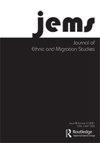Dual frames of reference: naturalization, rationalization and justification of poor working conditions. A comparative study of migrant agricultural work in Northern California and South-Eastern Norway
IF 2.8
1区 社会学
Q1 DEMOGRAPHY
引用次数: 0
Abstract
This paper analyzes how agents such as agricultural migrants, agricultural employers and local community representatives apply the dual frame of reference (DFR) to naturalize, rationalize and justify the presence of exploitative labor practices for agricultural migrants. The paper gives a qualitative account of social dynamics in two agricultural-dependent communities located in Northern California and South-Eastern Norway. Qualitative one-on-one interviews with agricultural migrant workers (n = 11), employers (n = 10) and community representatives (n = 12) were conducted in English and Spanish. Our findings demonstrate how DFR is utilized by employers to justify labor strategies that rely on migrant workers, employees to rationalize their participation in exploitive work, and by local community representatives to naturalize the exploitative labor practices of migrant workers in their community. Our research findings further add to the analysis by suggesting that the frames of reference are dynamic based on changes of material conditions in the home country. Lastly, we find a third frame of reference focused on the future of the agricultural worker and the hopes for future generations. Combined, these perspectives add to the understanding of the disempowerment of workers, lack of successful changes and overall, upkeeping of exploitative migrant labor systems in the agricultural industries and beyond.双重参考框架:归化、合理化和证明恶劣工作条件。加州北部与挪威东南部农业迁移的比较研究
本文分析了农业移民、农业雇主和当地社区代表等代理人如何运用双重参考框架(DFR)将农业移民的剥削劳动行为归化、合理化和正当化。本文给出了一个定性帐户的社会动态在两个农业依赖社区位于北加州和挪威东南部。用英语和西班牙语对农业农民工(n = 11)、雇主(n = 10)和社区代表(n = 12)进行了定性一对一访谈。我们的研究结果表明,雇主如何利用DFR来证明依赖农民工的劳动力战略是合理的,雇员如何利用DFR来合理化他们参与剥削性工作,以及当地社区代表如何利用DFR来使农民工在其社区中的剥削性劳动实践归化。我们的研究结果进一步增加了分析,表明参考框架是动态的,基于母国物质条件的变化。最后,我们发现了第三个参考框架,关注农业工人的未来和对后代的希望。综上所述,这些观点有助于理解工人被剥夺权力、缺乏成功的变革以及在农业和其他行业中剥削移民劳工制度的总体维持。
本文章由计算机程序翻译,如有差异,请以英文原文为准。
求助全文
约1分钟内获得全文
求助全文
来源期刊

Journal of Ethnic and Migration Studies
Multiple-
CiteScore
7.80
自引率
9.10%
发文量
157
期刊介绍:
The Journal of Ethnic and Migration Studies (JEMS) publishes the results of first-class research on all forms of migration and its consequences, together with articles on ethnic conflict, discrimination, racism, nationalism, citizenship and policies of integration. Contributions to the journal, which are all fully refereed, are especially welcome when they are the result of original empirical research that makes a clear contribution to the field of migration JEMS has a long-standing interest in informed policy debate and contributions are welcomed which seek to develop the implications of research for policy innovation, or which evaluate the results of previous initiatives. The journal is also interested in publishing the results of theoretical work.
 求助内容:
求助内容: 应助结果提醒方式:
应助结果提醒方式:


